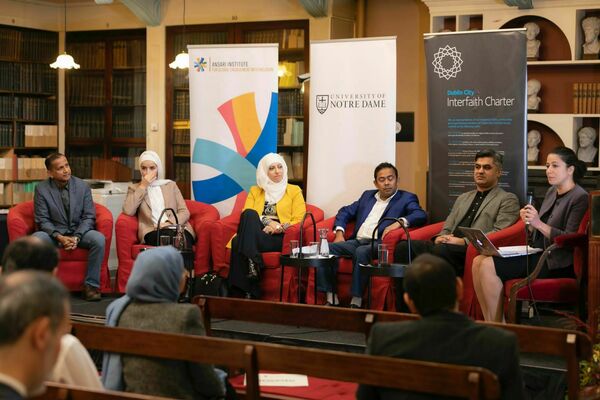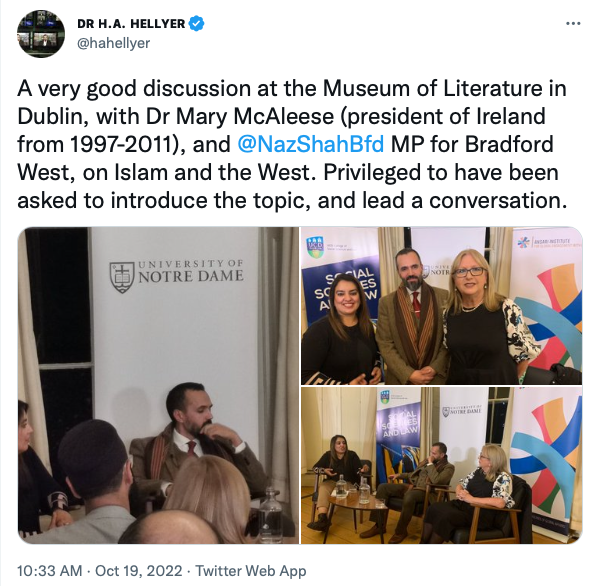Event Brief: Islam and Ireland Conference
Dublin, Ireland -- Museum of Literature Ireland and the Royal Irish Academy
This past week, the Clingen Family Center for the Study of Modern Ireland, part of the Keough-Naughton Institute for Irish Studies, and the Ansari Institute for Global Engagement with Religion jointly hosted a conference at the Royal Irish Academy in Dublin highlighting the everyday experience of Muslims living in Ireland.
The two-day event was co-organized with the Dublin City Interfaith Forum and the Newman Centre for the Study of Religions at University College Dublin, with the goal of understanding the challenges faced by Irish Muslims and their unique experience of living in Ireland, with attention to perspectives from both Northern Ireland and the Irish Republic.

"The task of the new Clingen Family Center is to explore modern Ireland in all its diversity,” explained Prof. Colin Barr, the center’s newly appointed director. “I can think of no better inaugural event than bringing together representatives of Ireland's fastest growing religious community to explore the place of Islam in Irish society."
On the opening evening, attendees enjoyed an evening discussion and reception held in the ornately decorated rooms formerly belonging to Irish Catholic Cardinal John Henry Newman that now house the Museum of Literature Ireland—a symbolic and uplifting start to the collaborative efforts on display over the next two days. Simon Harris, the Irish government’s Minister for Further & Higher Education, Research, Innovation & Science opened proceedings with remarks stressing the importance of inclusivity and diversity in Irish society, followed by an introduction from Acting University College Dublin President Mark Rogers.
In a conversation moderated by Dr. Hisham Hellyer of the University of Cambridge, former President of Ireland Dr. Mary McAleese (1997-2011) and Naz Shah, sitting Member of Parliament in the United Kingdom, offered compassionate and mutually illuminating analyses of the unique conditions in Ireland that in turn create an experience for Muslims on the island that differs in many ways from that of their co-religionists living in Europe.

Unlike many academic conferences, however, which offer a platform only to scholars, experts, and high-ranking public officials like McAleese and Shah, the second day of the forum gave ordinary members of the Muslim community a rare opportunity to share their experiences with others and offer insights and advice to each other as well as to a general audience. The full-day event took place at the Royal Irish Academy in central Dublin and included a dedicated prayer-room and Halal catering. Panelists included physicians, community workers, local councilors, activists, political advisors, and a police officer, among others. A final panel rounded out the event with comparative analysis from American and French Muslims, who offered both a counterpoint to the Irish experience and a lens for viewing Ireland in the wider global context.
The conference has been received favorably in the Irish media, with video coverage aired on RTÉ News, Ireland’s national broadcaster. A related article on RTÉ online focuses on positive developments in policing and education in interviews with conference participants, while the nation’s leading newspaper, The Irish Times, foregrounds the difficulties faced by Irish-born converts to Islam.
The organizers plan to continue exploring the role and experience of Islam in Ireland through future collaborative events and a shared online presence. "There is something distinctive about the Irish experience,” says Dr. Mahan Mirza, Executive Director of the Ansari Institute, highlighting a key theme of the conference. But, he wonders, “can the Muslims of Ireland present a positive example for the rest of Europe? The growing Muslim presence in Ireland is as much about the future of Europe as it is about the future of Islam.”